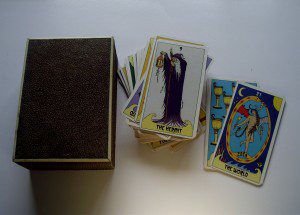I’ll be clear up front on two counts. I have undertaken divination for money on many an occasion, and I don’t like Sylvia Browne. I had a book of hers to review years ago; I thought it was smug, patronising, and pretty useless. I’ve had no experience of her performances on TV, but am aware of posts like this and the anger around what this so-called psychic has done to countless people over the years.
There are some who think that the only ethical approach is not to charge money for divination work. I don’t accept that. When people give of their time and energy, giving something in return should be fine. It should be proportionate though. Most of my divination work has been done as a fundraiser for various good causes –I charge a few pounds/dollars. Overcharging – asking for more than you would pay for that amount of time form some other moderately skilled and useful professional – is not okay. Mind you, I think a fair few ‘professional’ bodies are horribly overcharging their victims too, but that’s another story.

Divination work, when it’s done well, is at least as much about the past and the present as it is about the future. It also functions as a kind of informal counselling. Once the stones or cards are on the table, people feel enabled to say what was worrying them, to air problems and ask questions. Often good divination work is just good counselling work – listening and helping people find their own solution, perhaps using your tool of preference as a useful prop.
There are limits with all forms of divination. I am absolutely rubbish about time, I can’t tell past from future reliably, I can just say ‘I see a thing, but I do not know when.’ I’m clear about that issue, and people have to figure the time scales out for themselves. Usually that’s not a problem. If I pretended I could see everything plainly and gave people time frames, I could hurt and harm them.
The future is not cast in stone. Just looking at it can change it. Thinking about it changes it, and as we imagine the future we reinvent our own possibilities. Thus it is really important to be clear that all you can divine is potential. What actually happens on the day might be different. If I say you’re going to have a bad car accident if things carry on as they are, and as a consequence you stop being a speed demon and become a careful driver, everything has changed, and you might well not have a crash, maybe just a small bump.
The past is not that solid either. How we think about it shapes how we understand it, what we think it means, and thus we can re-write aspects of our history just by seeing things in a different light. The past is just stories. Divination is mostly stories too. Ethical divination means helpful stories that allow us to move forward. That’s not the same as ‘true’ because ‘true’ is subjective. But that doesn’t mean that any old crap will do.
Most of the time people seek divination for fun, or for the obvious basics – love, work, and money. What most people want is reassuring and encouraging. On the whole in these things, stuff comes around in the form of people and opportunities, and there’s not much you can get wrong. There will be scope for making life better, and for failing miserably. There will be better choices of partner out there, and assholes. You don’t need a crystal ball for that. Mostly the people asking don’t need the crystal ball either, they just need a neutral sounding board while they get their ideas straight, and providing that is a useful service.
Then there’s the other stuff. That small minority of people who are suffering in ways that do not show on the surface. They don’t always self-announce, although if you’re any good at divination you’ll know when you’ve got a serious one. Be a good human being, first and foremost. Make sure they do the practical things first – doctors, police, self help groups, all the real things that can be explored. There are no magic wand solutions for everything, even when you have a magic wand. Real commitment to change is always called for, and some things are beyond changing. Dead people particularly.
The hardest thing to say to a client, is ‘I don’t know’. It seems like admitting failure. You’ve set yourself up as some big authority with a finger on the pulse of destiny. ‘I don’t know’ is not what they wanted to hear. If you do not know, it is the right answer. If the question is so huge, so life shattering that it scares the hell out of you, then be honest about that. It helps. Clients are people too, and the solutions need to be human, not dished out from on high.
Ethical work is always grounded in compassion. That means no false hope, and no needless crushing. It’s often better to be looking for coping mechanisms than answers, ways of moving forward. Offering possibility is always more useful than asserting facts, because we seldom get to see the whole picture. Divination should empower people to find their own way through, trust their own instincts and draw on their own strength. If you aren’t doing that, you aren’t helping.
Druid Thoughts is published on occasional Wednesdays on Agora. Follow it via RSS or e-mail!













